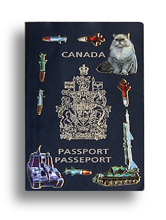
|
Lorna Mills and Sally McKay
Digital Media Tree this blog's archive OVVLvverk Lorna Mills: Artworks / Persona Volare / contact Sally McKay: GIFS / cv and contact |
View current page
...more recent posts
spot the art...

Now that's what I call display! I love this documentation of one of Tom Moody's animated gif installations put on by Telic Arts Exchange in LA. The multivalent bric-a-brac makes a great analog to the A.D.D.-ish attention span environment of looking at art online.
(yes I said 'multivalent'. suck it up. Any griping and I'll start throwing 'heterogeneity' around.)

Lately I have been tangentially dealing with my distress over the miserable shit happening in Gaza by watching online vids about Jewish queer theorist/philosopher Judith Butler. Butler is famous for her work on gender and identity, but her stuff on Israel and war is also great. She's tough as nails. In one candid profile documentary, Butler talked about learning the importance of public mourning from the AIDs crisis, which she now applies to war, asking "who we can grieve and who we cannot grieve, what is a grievable life?"
part 1, part 2, part 3, part 4, part 5, part 6
Excerpt from Part 6:
Public mourning is not something we do just because we have personal needs to grieve. We do have those, I'm sure, but I think public mourning gives value to lives, bring us into a kind of heightened awareness of the precariousness of lives and the necessity to protect them, and also to understand that that precariousness is shared across national borders. There's no possibility of overcoming our precariousness, there's no possibility of becoming invulnerable, there's no possibility of evading death. It's just not going to happen. So to accept that kind of precariousness, even finitude, as a condition of human life is maybe a different basis for a certain politics. It's the one that the US foreclosed quite quickly ten days after 9-11. And its the one that they do not permit by putting a stranglehold on the media, so that we can't understand the precariousness of those lives, or the value of those lives that we've damaged or destroyed.There is also an excellent short speech from a Berkely teach-in on the Israeli bombing of Lebannon
I suppose that's my link. It seems AIDS activism did make public mourning very important. Las Madres in Argentina have done the same. Where are the disappeared? It seems crucial to make a lot of noise about those who have disappeared without a trace. It seems important to mark that, to make a trace, to make a sound. To disrupt that notion of the public sphere that would make certain kinds of images unseeable, make certain kinds of noises inaudible, make certain kinds of words unsayable. That's a kind of censorship that not only restricts what we can know, but also hampers our capacity to understand who has been lost, what violence has wrought and the value of human lives.
And a really good long lecture on Primo Levy and Israel